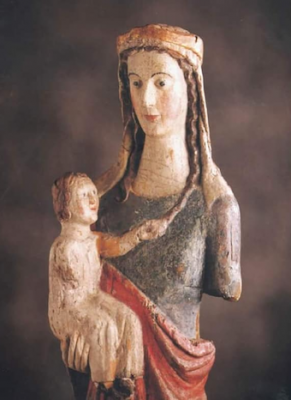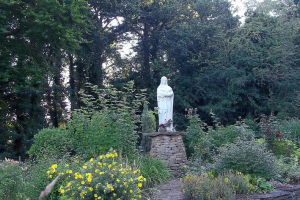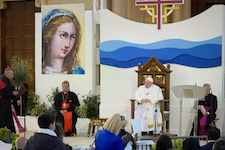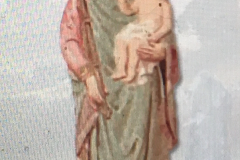Ireland: Clonfert formally recognised as a Diocesan Marian Shrine

Our Lady of Clonfert
Source: Irish Catholic Media Office
The Bishop of Clonfert and Bishop of Galway, Kilmacduagh and Kilfenora, Michael Duignan has today travelled to the Shrine of Our Lady of Clonfert to bless the newly renovated church and to consecrate its new altar. In recognition of the importance of the Shrine as a pilgrimage centre for so many, he also formally approved Canonical Statutes for the Shrine and signed a Decree to raise the Shrine of Our Lady of Clonfert to the status of a recognised Diocesan Marian Shrine. In the same act, Father Declan McInerney, Parish Priest of Eyrecourt, Clonfert and Meelick, was appointed the Shrine's first Rector and the 31st of May was declared a special day of prayer and devotion to Our Lady of Clonfert from this day forward.
Speaking at the Shrine, Bishop Duignan said: "This is a historic day for the Shrine of Our Lady of Clonfert, for the local parish community for the Diocese of Clonfert and indeed for the entire Church community. Although in many places traditional religious practices may seem to be in a phase of decline the practice of pilgrimage remains a meaningful source of spiritual nourishment for so many people.
"Today, we formally recognise the long history of devotion to Our Lady in this place. We also look forward to the development of the Shrine as a fount of rich spiritual sustenance for future generations and in particular as a spiritual refuge and healing for those who, like the statue itself, have been wounded as they travel the journey of life. Let us turn our hearts and minds to Our Lady of Clonfert invoking her intercession with God himself so that these new initiatives might bear much spiritual fruit."
The newly appointed Rector of the Shrine, Father Declan McInerney said: "Over the years, I have seen, day in day out, the constant stream of visitors to the Shrine. They come from the local area but also from throughout the country and abroad. Many come with their own worries and fears - illness or difficulties in their relationships, at work or in their spiritual lives. Others come to ask for Our Lady's intercession for their family or neighbours or simply because someone has asked them to call and pray for them here or to remember sons and daughters taking exams. Over and over again, I meet people returning to the Shrine to give thanks for favours received, nerves calmed and a new perspective they have been given on a difficult situation in their life. The Shrine is a special place for so many people. I am thrilled that today we are officially recognising its importance in so many people's spiritual lives for so long. I also look forward to leading its development as a pilgrimage centre and as a font of spiritual renewal for all but in particular for those wounded by life in the months and in the years to come."
History of the Statue of Our Lady of Clonfert
The statue of Our Lady of Clonfert dates from the late 13th/early 14th century. It is thought the statue may have originated from either Clonfert medieval Cathedral (built in the 8th or 9th century) beside the burial place of Saint Brendan or from the Abbey of Saint Mary de Portu Puro, located to the southeast of the medieval Cathedral.
Local folklore describes that in the 19th century a woodcutter was felling an old oak tree and while cutting the tree it began to bleed. Upon examination, he found the statue hidden in a hollow in the tree. In the process, he had unknowingly severed the left arm of the statue. It is believed that it had been placed there for safekeeping during the intense persecution of Catholics in Ireland during the Cromwellian period. As such, the statue bears witness to one of the most difficult periods for the Catholic faith in Irish history.
The statue is now housed in the Church of Saint Brendan, Clonfert in the Parish of Eyrecourt, Clonfert and Meelick in the Diocese of Clonfert. Carved from wood and brightly painted, the statue portrays a gently smiling Virgin carrying the infant Jesus in her right arm. Displaying a great tenderness, the child is depicted playing with a tress of the Virgin's hair. Sadly the left arm, severed when the statue was discovered, is now missing.
A Place of Pilgrimage
The very existence of the Statue of Our Lady of Clonfert is a sign of considerable devotion to Our Lady in this part of the country for the past 700 - 800 years. In recent years, the statue has become the focus of a renewed Marian devotion. Many come to pray before the statue to invoke Our Lady's intercession for themselves and their families. Many pilgrims come to seek divine assistance with the trials and tribulations of life or intercession for their own good health or the good health of others. The month of May has established itself as a particular period of devotion and pilgrimage. Each May, tens of thousands of people come to pray before the statue while the local parish organises formal liturgies and the celebration of the Eucharist each day.


















